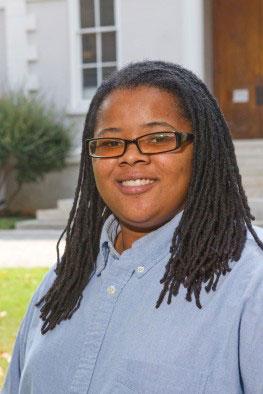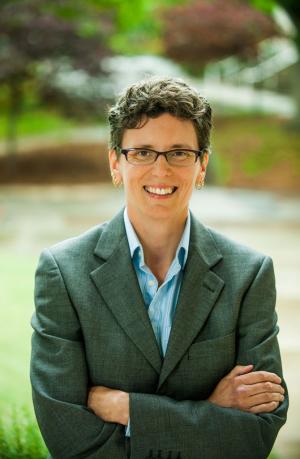UGA Employees Fight for Domestic Partner Benefits
If Asen Kirin had a wife, it wouldn't be a problem to put her on his University of Georgia health insurance. But since he is gay, his partner is on his own.
Georgia doesn't recognize same sex-marriages and prohibits spending state funds on benefits for unmarried employees' partners. Kirin and other UGA employees say they feel targeted by that policy, which they say discriminates against gay employees and hurts faculty and staff recruitment and retention.
“Every spouse of every faculty member—every spouse of every employee at the university—gets something that I can’t even dream of,” Kirin says.
Kirin, associate director of the Lamar Dodd School of Art, lives with his partner of 15 years, who is self-employed and must buy his own insurance.
“This is the most unattractive, unappealing and excessively expensive option that you can possibly conceive of,” Kirin says. “It gives you nothing, it charges you all the time. This is not a secret. These are not desirable insurance policies. They do whatever they wish, they deny services, they increase the premiums. So ultimately, the most expensive options on earth are these private insurance policies that you can buy.”
Kirin says his partner suffers from allergies but is reluctant to see the doctor because even routine wellness procedures are exorbitantly expensive under his insurance policy. Worrying about his partner’s health has become a psychological burden for Kirin.
“You have to think about it, and you have to budget about it. We are one serious disease away from ruin,” he says. “Everybody’s placed in this position. And the delusion that you’re building a life, that you have stability—that’s a delusion. You’re one serious illness away.”
Emotional stress is just one effect of the state’s and UGA’s stance on domestic partner benefits.
“This kind of policy is not simply inferior by comparison to what I get,” Kirin says. “It is offensive and demeaning to live in the 21st Century, to be associated with an academic institution and to have this in your life.”
May 1 brought a small victory for Kirin and other employees in domestic partnerships. University System of Georgia Chancellor Hank Huckaby gave UGA permission to extend “soft” health care coverage, such as dental, vision and accidental death insurance, to the domestic partners of UGA employees. Employees cover the entire cost for soft benefits themselves; no state funds are involved.
“I really do think that this is a good thing,” Kirin says. “If we don’t acknowledge that this is a progress, we will really stall the bigger progress... to the day when everyone at the University is treated equally. Because that’s not now.”
A Long Campaign
It is the latest step in decade-long effort to win benefits for domestic partners. When music theory professor Adrian Childs moved to Athens with his partner in 2001, he joined a group of faculty and staff called the Domestic Partnership Coalition of the University System of Georgia. They worked to convince the University System Board of Regents to grant healthcare benefits to the domestic partners of university employees by adding them to existing health insurance programs. The group succeeded in getting resolutions passed at several schools, with UGA’s University Council approving a resolution in 2002, but the regents did not respond.
In 2004, the coalition disbanded as its members focused on fighting an amendment to the state constitution that reinforces the state ban on gay marriage, denies recognition of any other union in Georgia and prohibits conferring the benefits of marriage onto domestic partners.
“I think the switch of focus came because the complete silence from the Board of Regents meant that the statewide strategy of 2000 to 2004 probably wasn’t going to lead to any actual policy change,” Childs says. “But we had hope that we could achieve something locally, even if we couldn’t achieve anything system-wide.”
UGA faculty then began lobbying for a soft benefits policy like those passed by Georgia State University in 2000 and Georgia Tech in 2003. The University Council approved the drafted policy in 2005, but Adams withheld approval until 2006 as he sought legal advice. The university then began offering domestic partners some soft benefits, such as UGACards and access to the Ramsey Center, libraries and city buses.
In 2007, Georgia State, Medical College of Georgia and UGA faculty again passed resolutions asking the Board of Regents to address the issue. Once again, the resolutions went unacknowledged.
Kirin was involved in some of these early efforts, but frustrated by the board’s consistent silence, he distanced himself from the movement.
“I got so disheartened and depressed to witness the mechanisms of what happened back then that I could not possibly subject myself to going through this again,” he says.

Ricky Roberts
In 2012, Ricky Roberts became chairwoman of UGA GLOBES and revived the issue. With the help of Georgia Equality and Lambda Legal, she drafted a new proposal that asked the university to privately fund a domestic partner benefits program.
“Basically, all we’re looking for is equal pay for equal work,” Roberts says. “These employees do the same work and are eligible for the same benefits as their coworkers, but they’re not getting them simply because they happen to be lesbian, gay, bisexual or transgender. And that’s just not right.”
The University Council approved a version of Roberts' proposal in September, and Adams wrote to the Board of Regents in December to ensure that a privately funded soft benefits program would be permissible. He also inquired about the possibility of privately funding full benefits. Huckaby responded in favor of soft benefits funded by employee contributions. He expressed uncertainty about the board’s role in the creation of a full benefits package, but did state that it would have to be “truly private—privately funded, privately insured, privately accounted for and privately administered.”
The university will begin implementing its new soft benefits policy June 30, the last day of Adams’ 17-year tenure as president. The question of full benefits, however, “will, unfortunately, require further study,” Adams said in a statement.

Janet Frick
“I am very pleased with this step,” says Janet Frick, a psychology professor and chairwoman of the University Council’s Human Resources Committee. “I think it is a good and important step along the road. It’s not the end of the process, but it is a part of the process.”
The Next Steps
UGA is late in that process compared to other schools. Georgia State, Georgia Tech, Kennesaw State, Georgia Perimeter College and Georgia Regents University (formerly MCG) began offering soft benefits to domestic partners without seeking approval from the Board of Regents and have been doing so for years. Seventy-two percent of public universities already offer domestic partner benefits, with the top 10 offering full benefits.
“I know for a fact there have been candidates for high level positions at UGA who have turned us down because we didn’t have this in place,” Frick says. “It’s not just the people who benefit from it—it’s a marker of how progressive a school is in terms of its benefits. So even for people who don’t personally need it, they still look at it as a sign of commitment to issues of diversity and justice and equality. So it does not look good that we don’t have that.”
The new GLOBES chairwoman, DeeDee Kane, joined the Terry College of Business in 2011 after spending three years at the Massachusetts Institute of Technology, which has offered domestic partner benefits since 1999.
“For myself personally, going from a university and a state where I had domestic partner benefits and the right to marry, into a state without either of those things was sort of—somehow I now am less of a person in the eyes of the state,” she says.

DeeDee Kane
Kane doesn’t need the benefits herself at the moment, but that’s not the point. “It’s more the concept. It’s more the having than the using,” she says. “It just feels like you’re on equal footing with everybody else.”
Although it may take time to get them, Kane is hopeful about the push for full domestic partner benefits. “I think given the situation and given the complexities of funding, it makes sense,” she says. “It’s still unfortunate that we don’t have full benefits. I mean, it’s a fairness issue, it’s an equity issue, but it’s also a political issue. And so it has to be handled appropriately.”
There are ways to circumvent the state ban. According to GLOBES, the University of Wyoming’s external research funding revenue, most of which comes from the federal government, pays for its benefits, and the University of Arizona allows employees with domestic partners to pay the same premiums as those on the state-funded plan while providing a separate plan for them. The University of Florida uses money from grants, federal contracts and the University of Florida Foundation to fund its program.
Proponents in Athens hope to use the UGA Foundation in a similar way.
With a participation rate between 0.5 and 1 percent at most schools with full domestic partner benefits, Frick expects about 50 people to sign up at UGA at a cost of about $270,000.
“The amount of money is minimal compared to other expenditures,” Kane says. “The money is somewhere. I know in this fiscal climate, things are tight, but the money is somewhere. If there’s a will, there’s a way. We can do this. And I think the people generally want to see it happen—it’s just a matter of how.”
For now, Kane, Frick and the others wait to see how incoming President Jere Morehead will address the issue. Morehead declined to comment.
“President Morehead has a lot on his plate as he comes in, so we understand that this process will take some time,” Frick says. “But I feel confident that it won’t fall off the radar at this point.”
In the meantime, Kane hopes to lead GLOBES in collecting data about faculty retention and loss over the issue of domestic partner benefits.
“I think that would be useful to know,” she says. “We don’t have that data. A lot of it’s anecdotal, but it has happened, and I do know it’s happened. And that’s a loss for the University.”












comments